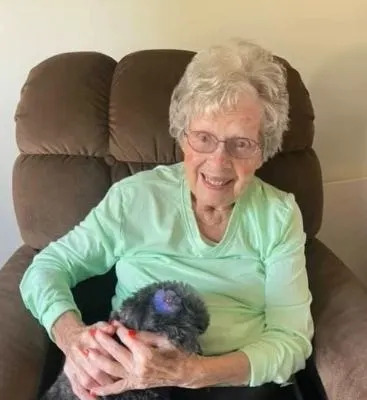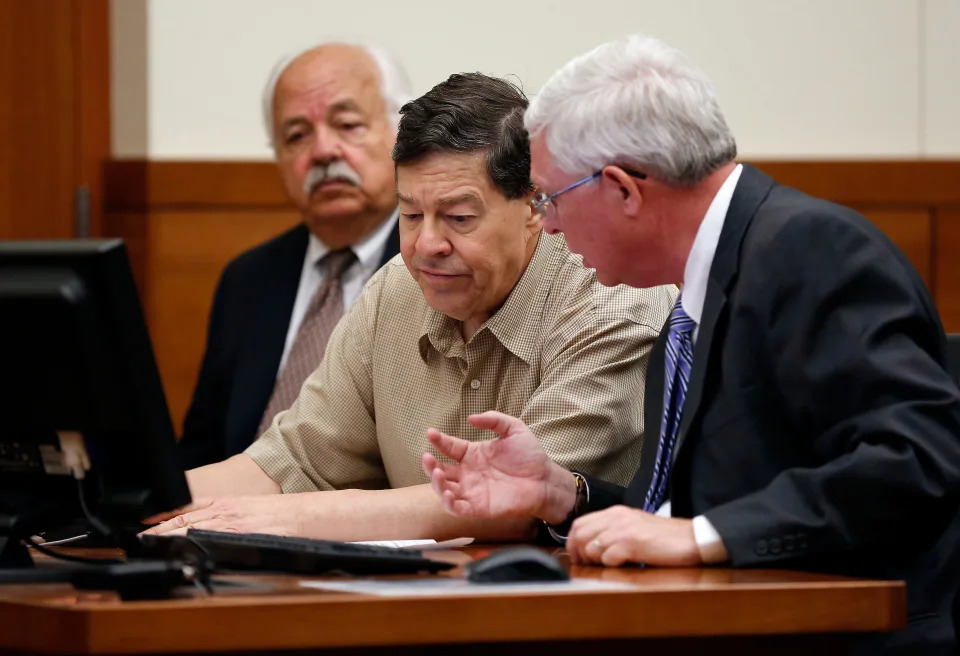Ohio attorney investigated for adding himself, family members to clients' wills
A longtime attorney who specializes in estate planning, probate and guardianship cases is being investigated by Ohio's Office of Disciplinary Counsel for including himself and a relative as beneficiaries in the wills of his elderly and legally incompetent clients.
The disciplinary counsel, a branch of the Ohio Supreme Court that investigates, and prosecutes attorneys and judicial officers who are accused of ethical misconduct, is not permitted to comment on specific cases before formal charges are filed. But at least two grievances have been filed against John B. Mashburn, a long-time Groveport attorney, according to the woman who filed one of them.
Donna Harlow, a retired government worker from Warren County, learned about a Mashburn will involving her mother's cousin, Marjorie Chester.

Chester was declared a ward of Mashburn in 2017. As guardian, Mashburn was ethically bound to look after Chester's physical and emotional well-being, for which he was compensated in regular payments from her estate.
But a year after that agreement, Mashburn had a will written for Chester. And Harlow, who was familiar with legal documents and working with attorneys, was shocked to see that Mashburn was named as a beneficiary. Worse still, Mary Mashburn, the attorney's spouse and a paralegal for her husband, was also listed in the will. Each were to receive 5% of an estate worth more than $1.5 million, upon Chester's death, Harlow said.
Chester died on April 15 at age 97. The will is still open and now being contested by Harlow and others.
"We kind of feel he's weeding out the vulnerable and wealthy, those with no family and under guardianship," Harlow told The Dispatch recently. "We just feel like she (Chester) has been taken advantage of."
While Harlow, her sister and her mother stand to gain financially, her quest is about justice, not money, she said.
She continued searching probate court records including Mashburn and found another will in which Mashburn, as legal guardian, names himself and his wife as beneficiaries of his ward's estate.
"If I found these cases, how many others are there out there?" Harlow asked. "He has hundreds of wards and I just wonder how many others he's taking advantage of."
Mashburn doesn't dispute the veracity of the wills. But he said that an unrelated attorney prepared and executed them for him.
Alvin Mathews, Mashburn's attorney said that Harlow and others are "ignoring a significant fact that makes the situation appropriate," specifically that Mashburn had another attorney involved.
In addition to filing her grievance with the Ohio Disciplinary Counsel, Harlow's also reported the situation to the Ohio Attorney General, Columbus Bar Association, Franklin County Guardianship Service Board and Central Ohio Area Agency on Aging, among others.
So far, Harlow received just one response, from a Franklin County Probate Court magistrate saying that her complaint had been dismissed because of Chester's death. She was encouraged to seek additional advice from a private attorney.
Should guardianship attorneys be included in their clients' wills?
The Dispatch has asked several attorneys if it is ethical to name yourself as a beneficiary in a will that is written on behalf of your client.
Without hesitation, they all said that they would never do it.
"Even if the client insists, the law would generally say no, because I represent you," said attorney Jay Michael, who specializes in such cases. One solution would be for the attorney to withdraw from the case and (have the ward) seek independent counsel to process the will.
"The reason we've appointed a guardian is because we've ruled that the person is incompetent," said Delaware County Juvenile Court Judge David Hejmanowski, who also handles probate cases. Having yourself included in a will "creates the impression that you are inappropriately influencing the person you represent."
The Ohio Rules of Professional Conduct that governs attorney actions agrees:
"A lawyer shall not solicit any substantial gift from a client. A lawyer shall not prepare on behalf of a client an instrument giving the lawyer, the lawyer’s partner, associate, paralegal, law clerk, or other employee of the lawyer’s firm, a lawyer acting “of counsel” in the lawyer’s firm, or a person related to the lawyer any gift unless the lawyer or other recipient of the gift is related to the client."
In each of the Mashburn wills, there is no evidence that he is related to any of his clients.
Paul Pfeifer, executive director of the Ohio Judicial Conference, said the answer may be "wrapped up" in the relationship between the ward and guardian.
"I would suspect that it's highly unusual," he said. "God help us if that's the norm."
If there is reason to include the guardian as beneficiary, Pfeifer said "the will should articulate the very special relationship that goes above and beyond the guardian that justifies that."
Joe Caligiuri, Ohio disciplinary counsel, is not permitted to discuss the Mashburn cases or even acknowledge that investigations are ongoing. He did comment about including yourself in wills, noting that "there could be some situations where that might be OK" But, he said, "generally speaking, that would be a no-no."
If an attorney is charged with misconduct, the Ohio Supreme Court has the authority to determine a range of punishment, from reprimand to losing your license to practice in Ohio.
Who is John Mashburn?
At 74, Mashburn is nearing retirement after more than 50 years practicing law in Ohio. He has had a long and trouble-free relationship with colleagues and those in Franklin County Probate Court, those who know him say. The Ohio Supreme Court's attorney directory states that he has no investigations or sanctions.
He is perhaps best known for inheriting the cases of now-deceased attorney Paul S. Kormanik, who in 2014 was investigated for the excessive billing of his elderly, disabled and incompetent clients for mundane work such as house cleaning, opening mail and buying Christmas presents with clients' own money.

In 2014, Mashburn told The Dispatch that he and Kormanik had so many cases that retired Franklin County Probate Court Judge Robert G. Montgomery told the attorneys that if something bad happened to one or both that Montgomery would have to shut down the court's normal operations and immediately scramble to find guardians for their wards.
A year after the investigation, Kormanik pleaded guilty to four counts of stealing from people for whom he was a court-appointed guardian, and to other charges connected to taking taxpayers’ money and falsifying records. Within days of his court appearance, Kormanik was found dead by suicide in his Upper Arlington home.
Read More: Convicted guardianship lawyer died of suicide
Since then, Mashburn has been admired for his longevity and character, said his former partner Steve McGann, who still works in the Groveport office they shared since 2017.
He describes Mashburn as "a typical country lawyer — he'd get up early and get his work done. He really did a lot of good."
"He's done a great job for a lot of people," said McGann, when asked about the ethical issues Mashburn faces. "But sometimes the lines get blurred."
"I sincerely think that John didn't think he was doing anything wrong," McGann said.
After their partnership ended after five years in 2022, McGann was cleaning up some of Mashburn's belongings and found a will and hand-written notes listing Mashburn and his wife among the beneficiaries. The will, he said, was written by Mary Mashburn, a paralegal who works for her husband.
He collected the information and notified Franklin County Probate Court officials. But he didn't hear back.
He wondered if he should do more to help protect the reputation of guardianship attorneys.
"I wrestled with it for several months," McGann said. "If I don't bring this up and it comes up later, it's going to look like I let John off the hook ... or the reputation of probate attorneys in general," McGann recalled thinking.
"I called a couple of my friends to ask what my responsibility is to the bar," McGann said, who said he eventually sent a detailed chronology and exhibits to the Ohio Disciplinary Council, including the decision from a 2022 case: "Toledo Bar Association versus Cook" which states "There are no circumstances under which an attorney may prepare a will or trust in which the attorney, the attorney’s family, or the attorney’s affiliates are named beneficiaries, unless the beneficiary is related to the client."
He eventually called Mashburn, telling him "Hopefully, I'm doing you a favor."
What Mashburn says
Contacted at his Dublin home, Mashburn declined to answer specific questions related to the wills, except to say that maybe his wife typed up the documents.
He said that McGann was likely upset about their partnership ending in November and chose to file complaints against him.
He said that many of his colleagues already know about the investigations and that reporting it in the news won't help, but added, "I understand what you have to do."
"I tried to retire four years ago and then this comes up," he said.
"I've never known him to be unethical," said attorney Jay Michael, who has known Mashburn for years. "I'm surprised. This is somewhat of an outlier. I've always found him to be honorable."
Meanwhile, Donna Harlow said she just wants answers from authorities who can prevent similar problems happening to others.
"Why does it take some nosy person like me? If I can dig this stuff up, why can't they do it? Why are they letting other attorneys do this."
She would also like some form of justice for Chester, and a message sent to others who might take advantage of the elderly or incompetent.
"She had no kids or siblings that are alive. If that was me," Harlow said, pausing to collect herself, "I would hope that someone would stick up for me at 97."
dnarciso@dispatch.com
This article originally appeared on The Columbus Dispatch: Ohio attorney John Mashburn named as beneficiary in clients' wills


